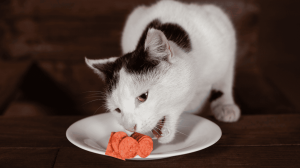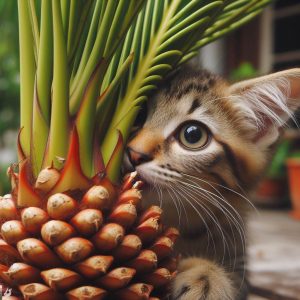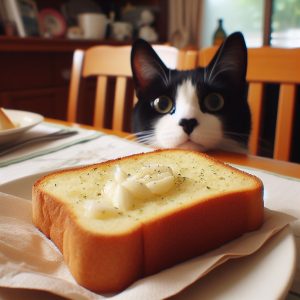Pepperoni – the spicy, savory salami topped on pizzas or served as an appetizer. Its smoky, salty, slightly spicy flavor makes it an irresistible snack for humans. But can cats eat pepperoni?
As cat parents, it’s our duty to understand our furry friends’ nutritional needs and know what human foods may harm them. So let’s dive into whether pepperoni is safe for cats, risks to be aware of, and healthy treat alternatives to consider instead.
Overview: Can Cats Eat Pepperoni?
The short answer is no – cats should not eat pepperoni.
While pepperoni may seem like an appealing snack to cats thanks to its strong smell and flavor, it can be toxic and dangerous for their health.
Pepperoni contains high amounts of fat, salt, spices, preservatives, and nitrates that can cause gastrointestinal upset, pancreatitis, vomiting, diarrhea, and even liver or kidney damage in cats when consumed.
Commercial pepperoni is highly processed and made for human consumption, not for cats. It offers no nutritional value for cats and the risks outweigh any benefits.
Even just a few bites of pepperoni can make cats sick, so it’s best to avoid giving it to them altogether. There are many other people foods safe for cats in moderation and healthy cat treat alternatives to give instead.
Now let’s explore why pepperoni can be harmful for cats in more detail.
Why Pepperoni is Unsafe for Cats
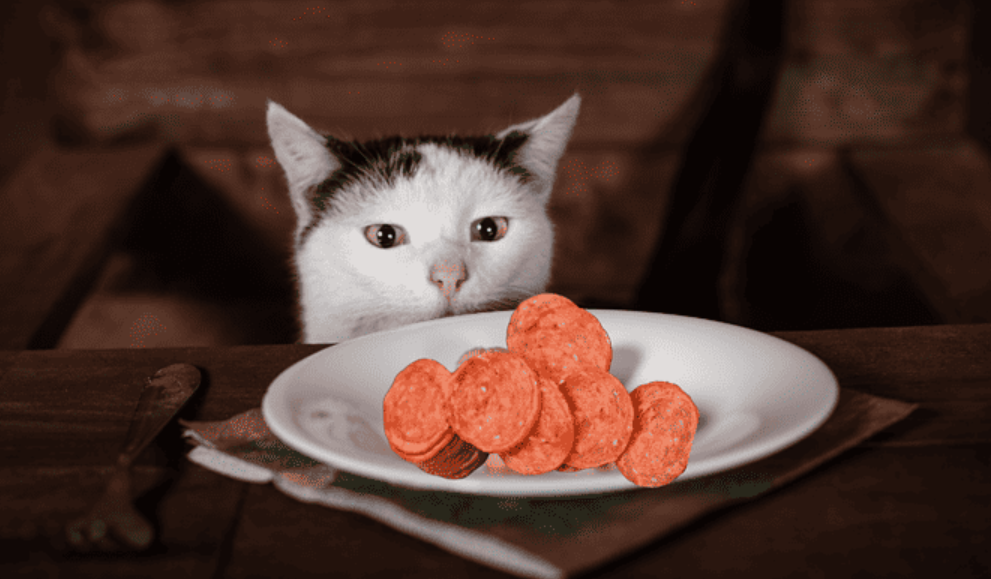
There are several ingredients and compounds found in pepperoni that make it a risky food for feline health:
High-Fat Content
Pepperoni is very high in fat content – around 50% fat by volume. This gives it that rich, meaty flavor but too much dietary fat can lead to obesity, pancreatitis, and other issues in cats.
Felines have a low tolerance for fatty foods. Consuming pepperoni can overload their system and lead to digestive upset.
High Salt Content
Pepperoni also contains added salt (sodium) to enhance its flavor. Too much sodium is unhealthy for cats, especially if it causes them to get thirsty and drink more water.
Excess sodium intake can lead to kidney problems, high blood pressure, and heart disease in cats over time. It’s best to limit their salty snack options.
Spices and Seasonings
Pepperoni gets its signature spicy kick from seasonings like paprika, garlic, onion, chili pepper, and black pepper. These spices and herbs may irritate a cat’s sensitive digestive system.
Ingesting pepperoni can cause stomach cramps, diarrhea, and vomiting in cats. The spicy flavors may also put off some fussy felines from the taste.
Nitrates/Nitrites
Sodium nitrate and nitrite compounds are commonly added to cured and processed meats like pepperoni to preserve color and prolong shelf life. But nitrates/nitrites can be toxic to cats when consumed in large amounts.
Too much nitrate/nitrite intake poses a risk of dangerous methemoglobinemia – where hemoglobin can not effectively transport oxygen throughout the body.
High Histamine Levels
Histamines are naturally occurring compounds that get released when proteins break down. Aged, fermented meats like pepperoni tend to have higher histamine levels as they use time to develop that unique flavor.
These excess histamines can cause an allergic reaction when cats eat pepperoni, triggering symptoms like itching, hives, swelling, and trouble breathing.
Other Chemical Preservatives
To extend shelf life and prevent spoilage, various chemical additives and preservatives are used when making commercial pepperoni. These include ingredients like:
- Sodium erythorbate
- Sodium phosphate
- Sodium nitrite
- Citric acid
- Ascorbic acid
While these chemicals are considered safe for human consumption, they may cause adverse effects in cats like gastrointestinal irritation or metabolic issues. It’s best not to expose cats to excess preservatives.
Health Risks of Cats Eating Pepperoni
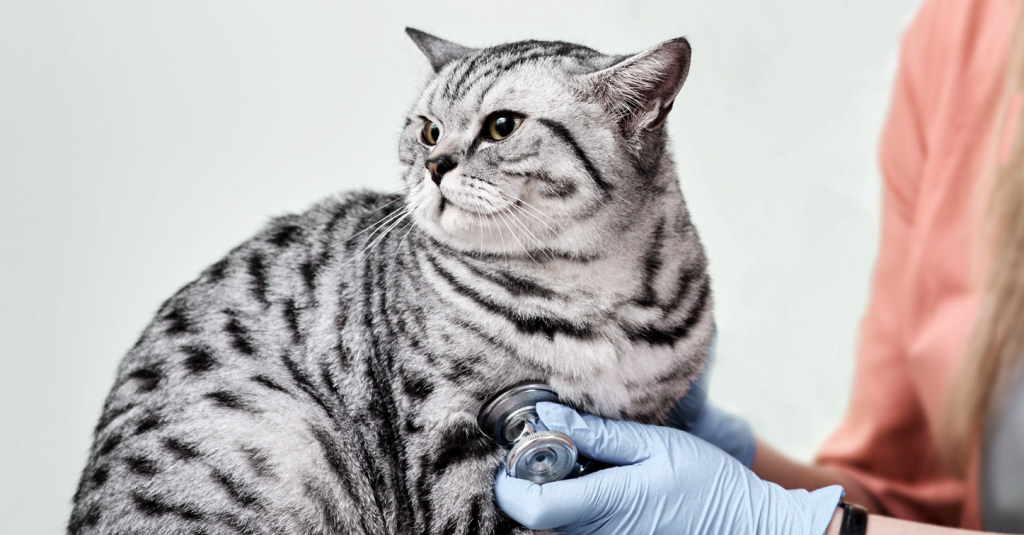
Given the various ingredients that make pepperoni unhealthy for cats, ingesting even a few bites can cause several serious health issues:
1. Digestive Upset
The high fat, salt, spices and preservatives in pepperoni are likely to cause gastrointestinal distress in cats. Eating pepperoni may result in nausea, vomiting, diarrhea, gas, and cramping.
At best, this can lead to a few days of discomfort and appetite loss. At worst, it can cause dehydration and malnutrition in cats if the digestive upset is severe.
2. Pancreatitis
The high fat content of pepperoni poses a risk of triggering pancreatitis – inflammation of the pancreas – in cats.
Pancreatitis can be extremely painful and cause loss of appetite, lethargy, vomiting, diarrhea, and abdomen pain. It often requires hospitalization and intravenous fluids. Treating pancreatitis in cats can be expensive.
3. Kidney Problems
Excess sodium intake from pepperoni’s added salt can put stress on your cat’s kidneys over time. This may lead to kidney stones, infections, or kidney disease.
Kidney problems are common in older cats so avoiding sodium-rich foods like pepperoni helps reduce the risk of kidney damage.
4. Liver Disease
The preservatives and nitrates found in pepperoni are metabolized and filtered by the liver. If cats regularly consume these processed meat additives, it can overload the liver and potentially lead to liver disease.
Symptoms of liver damage in cats include lack of appetite, weight loss, lethargy, vomiting, and jaundice. It’s crucial to get prompt veterinary treatment for suspected liver disease.
5. Dehydration
Pepperoni’s high sodium content may increase your cat’s thirst and water intake. But the gastrointestinal upset it causes can lead to vomiting and diarrhea, resulting in the cat becoming dehydrated.
Dehydration is particularly dangerous for older cats or kittens. Always monitor your cat’s hydration status closely when they are unwell.
6. Obesity
Pepperoni’s high fat and calorie content can quickly lead to weight gain and obesity in cats if they manage to eat a large amount.
Obesity puts cats at risk for many health complications like diabetes, arthritis, heart disease and reduced immunity. Avoid feeding high fat treats.
7. Constipation
Some cats may get severely constipated after eating pepperoni due to its high fat content.
Constipation can be very uncomfortable and even cause a dangerous intestinal blockage if severe. Look out for symptoms like straining to defecate or hard, dry stools.
8. Nutritional Deficiencies
Pepperoni offers no nutritional value for cats. Eating it may fill up their small stomachs and make them miss out on balanced meals. This can lead to vitamin and mineral deficiencies over time.
It’s crucial to limit “empty calorie” treats and feed cats a complete and balanced diet every day for good health.
Now that we’ve covered the many risks, let’s go over some proper treatment steps to follow if your cat accidentally eats pepperoni.
What To Do If Your Cat Eats Pepperoni
Despite your best efforts to keep pepperoni and other harmful human foods away from your cat, accidents do happen!
Here is the best course of action if you discover your feline companion has eaten pepperoni:
- Remain calm – Getting stressed or worried will only alarm your cat more.
- Do not induce vomiting at home – This can do more harm than good.
- Call your vet immediately – Describe what and how much they ate. Follow any instructions for bringing your cat in.
- Bring a sample of the pepperoni your cat ate to show the vet.
- Monitor for any symptoms like vomiting, diarrhea, lethargy, or pain. Alert your vet if symptoms arise.
- Stick to a bland diet for a few days after – boiled chicken and rice is gentle on the stomach.
- Limit exercise/activity to allow their digestive system to recover.
- Give your cat access to fresh, clean water to prevent dehydration.
With prompt veterinary treatment, most cats recover fully after eating some pepperoni. But do be vigilant about symptoms and monitor long term health. Avoid giving any more pepperoni or table food scraps.
Now let’s go over some healthier treat alternatives cat owners should offer instead!
Safe, Nutritious Treats for Cats
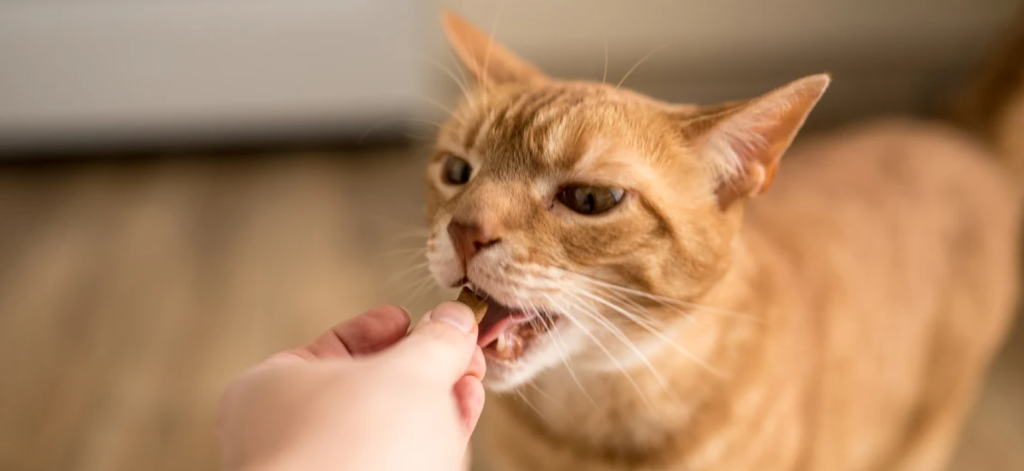
While pepperoni should be off limits, there are many cat-friendly human foods and treats you can offer your feline as an occasional snack:
1. Cooked White Meat Chicken/Turkey
Shredded, boiled chicken or turkey (with fat/skin removed) makes a tasty protein-rich treat cats love. It can be served warmed or chilled.
2. Canned Tuna (Low-Sodium)
Look for canned tuna packed in water and low in sodium to give your cat a small fishy-flavored snack. Rinse first to remove excess oil.
3. Cooked Salmon
Flakes of cooked fresh salmon are loaded with healthy omega-3s and provide a savory fish treat for cats. Ensure it’s properly cooked and de-boned first.
4. Plain Yogurt
Non-fat, unsweetened yogurt contains probiotics to support your cat’s digestive health. Just a teaspoon or two is enough.
5. Freeze-Dried Meat Treats
Freeze-dried 100% meat treats (chicken, salmon, etc) are a healthy crunchy snack cats love. Choose grain-free options without preservatives.
6. Veggies (Cook, Purée)
Cook fresh veggies like carrots or sweet potatoes until soft, then purée to create a cat-friendly baby food paste treat. Limit to just a teaspoon serving.
7. Hard Boiled Eggs
A small piece of hard boiled egg (cooked without oil, salt or seasoning) makes a tasty protein snack cats can nibble on.
8. Unsweetened Whipped Cream
A tiny dollop of regular whipped cream (no sugar added) can be an occasional treat. The fat content is still high so limit portions.
9. Organ Meat Cat Food Topper
Sprinkle a pinch of freeze-dried organ meat treats like beef liver on their kibble to add natural flavor and nutrients.
10. Catnip
Most cats enjoy a sprinkle of dried catnip. It provides mental stimulation and is perfectly safe when used moderately.
11. Cat Grass
Grow and snip some “cat grass” (wheatgrass, oatgrass etc) for your cat to safely nibble on to aid digestion.
Be sure to introduce new foods slowly and in very limited quantities to check for any allergies or intolerances.
Stillunsure about certain human foods? Ask your vet for their pet food recommendations.
Healthiest Diet for Cats: Quality Cat Food
While occasional people’s food treats are fine, a nutritionally balanced cat food diet tailored to your feline’s needs is essential for their daily nutrition. Here are some tips for choosing the healthiest cat foods:
- Pick high-protein, meat-first recipes with real meat as the first ingredient. Avoid grain-heavy foods.
- Look for cat foods with added vitamins, minerals and fatty acids. Avoid artificial preservatives.
- Choose wet and dry food formulas for variety to keep your cat hydrated.
- Rotate between a few high-quality cat food brands.
- Transition slowly when changing foods to avoid digestive upset.
- Feed age-appropriate formulas for kittens, adults, and senior cats.
- Follow the portion sizes recommended on the label for your cat’s weight. Avoid over or underfeeding.
- Ensure constant access to fresh, clean drinking water. Change water daily.
Consult your veterinarian if you have any concerns about selecting nutritious cat foods tailored to your feline’s life stage and activity needs.
Key Takeaways: Should Cats Eat Pepperoni?
To summarize the key points:
- No, cats should never eat pepperoni – it provides no health benefits and poses many risks.
- Ingredients like fat, sodium, spices and preservatives make pepperoni toxic for cats.
- Consuming pepperoni can cause digestive upset, dehydration, pancreatitis and even long term damage.
- Immediately contact your vet if your cat accidentally eats pepperoni.
- Stick to designated cat treats and foods to provide balanced daily nutrition they require.
Keep all human foods like pepperoni safely away from your curious cats. With some patience and persistence, you can train kitties to only expect yummy cat treats!
Your feline friend relies on you for their health and wellbeing. By understanding proper cat nutrition and avoiding dangerous food temptations like pepperoni, cheese, chocolate etc. you can ensure your cat enjoys a long, healthy life!

